
To be listed on the CAMPOSOL TODAY MAP please call +34 968 018 268.
article_detail
Spanish News Today Editors Roundup Weekly Bulletin July 7

FEATURED ARTICLES: "Advice for dealing with the hot weather in Spain" and "Grand plan to build a channel tunnel between Spain and Morocco"
The Ashes series between England and Australia is hotting up with a crucial third test underway. The heat is on at Wimbledon, with the top tennis players in the world converging on London for two weeks to prove their mettle.
But that’s nothing compared to the heat in Spain right now. This week, planet Earth experienced its hottest ever day since records began, and in Spain there’s even talk of temperatures as high as 48 or 49ºC/120ºF in parts of Córdoba or Seville in the south. Silly temperatures.
How do you cope with the heat? Any tips and tricks to share? One registered nurse in Spain has got just that, going viral online amongst Spaniards now with his TikTok advice on what to do and (more often) what NOT to do in the heat this summer.
Also warming up seem to be Spanish relations with their near neighbour Morocco, with plans underway for a joint mega-construction project, though there are scalding criticisms about the two countries’ treatment of the migrant situation.
Can you feel the heat?
Handle the heat
Spain is heading for its second heatwave of a summer season that promises to be a scorcher like no other and the rest of the world is following suit, having already recorded the hottest day of all time globally on July 3rd, when thermometers averaged out at a decidedly steamy 17ºC across the planet.
That mightn’t sound too extraordinary along the Iberian Peninsula but changing weather patterns, attributed largely to carbon emissions and global warming, are creating worrying anomalies all over the place, like maritime heatwaves in the North Sea.
Further afield, the southern states in America continue to melt while China has been enduring a sweltering heatwave with temperatures above 35ºC every day.
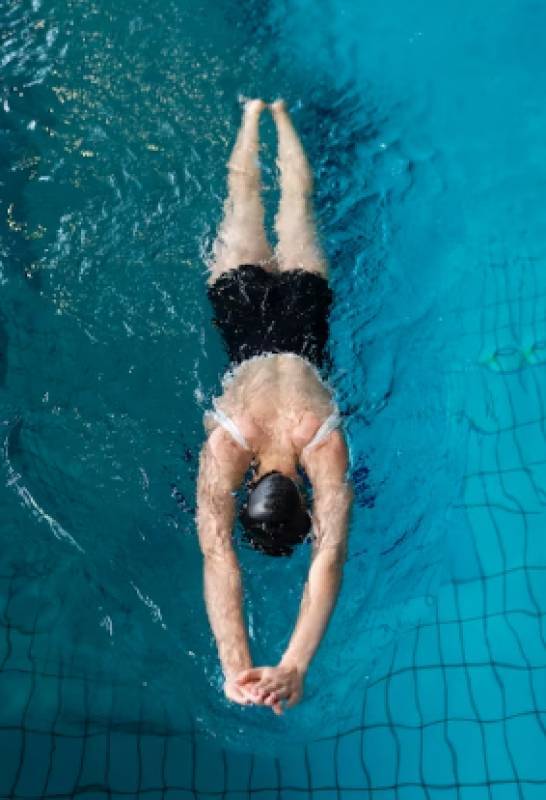 With the weather heating up, it’s the perfect excuse to hit the beach or the pool for a refreshing dip, but social media sensation Jorge Ángel, a registered nurse with more than 5 million followers on TikTok, has warned about a most unpleasant side-effect.
With the weather heating up, it’s the perfect excuse to hit the beach or the pool for a refreshing dip, but social media sensation Jorge Ángel, a registered nurse with more than 5 million followers on TikTok, has warned about a most unpleasant side-effect.While most of us strip off to our trunks for a swim, a surprising number of people still opt to don underwear beneath their swimsuits. There’s a variety of reasons, from keeping the sand away from those delicate areas to protecting one’s modesty in skimpier costumes.
But this really isn’t a good idea, according to Jorge. The main reason is that while swimsuits are made from breathable material designed to dry quickly, underpants will remain wet long after you leave the water, creating “more moisture and more risk of fungus” forming.
Probably not the beach souvenir most people have in mind.
Jorge is now famous on social media for offering sage and helpful advice, and possibly his most popular pearl of wisdom concerns using fans to cool off indoors. For several weeks now, many areas have endured a succession of tropical nights when the mercury fails to dip below 20ºC – punishing heat that makes it difficult for even the deepest of sleepers to nod off.
It’s common practice to switch on the air con or fan a couple of hours before bedtime to cool the room, but did you know that it can be very harmful to leave these devices switched on all night?
“The continuous movement of the air causes mites and dust to move more,” he said, greatly increasing the risk of allergy problems. If the air is hitting your face directly, the mucous membranes of the nose and mouth can dry out much more, which will cause you to produce more mucus that can lead to congestion and headaches.”
And for those with bad backs, an incessantly blowing fan can actually increase muscle pain and stiffness.
This doesn’t mean that you have to suffer through a sweltering night without any relief though. If you do want to use a fan, just make sure it’s angled slightly away so that it’s not blowing continuously in your face or, better yet, set the contraption to rotate.
Tunnel vision
Every once in a while, someone comes along with a big construction idea that changes the way we think about infrastructure in our world and what’s possible for human beings to achieve. Concorde. The Burj Khalifa in Dubai. That new mirror city ‘The Line’ that Saudi Arabia wants to build in the desert.
In many ways, the building of channel tunnel between France and the UK in 1994 was one of those, an unprecedented feat of underwater engineering the likes of which had never been seen before, and which revolutionised European and British travel.
Now, nearly 30 years later, Spain and Morocco are looking to replicate that success. The two countries, divided by just a few kilometres of water in the Strait of Gibraltar, have once again taken up discussions to build an underwater railway tunnel and gas pipeline that would link the continents of Europe and Africa in a way hitherto unheard of.

At a proposed 42 kilometres long, 27.8km of which would be underwater, it would still be smaller than the channel tunnel, but would also include a gas pipeline to supply energy to Europe from Morocco as well. It would run from Punta Paloma, in Spain’s Tarifa to Punta Malabata in the Bay of Tangiers, and there would be two single-track tunnels for goods and passenger trains.
The idea for a channel tunnel linking Spain and Morocco was actually first floated way back in 1981, but the sometimes strained relationship between the two countries (to put it politely) has meant the project became stalled on several occasions. Disputes over gas supplies and illegal migration from Africa to Europe, especially across the land borders of the Spanish exclave cities of Melilla and Ceuta located on the northern coast of Morocco, have caused friction over the years, but a joint bid to host the 2030 World Cup may go some way towards easing tensions.
Now, with the revival of the project, it is estimated that it could be ready as soon as some time in the 2030s or 2040s, a mere 60 years later.
Frontier justice
An extra transport link between Morocco and Spain would allow tourists from both countries to visit the other more easily, but it would of course mean another potential crossing point for those illegal migrants trying to get into Europe from Africa.
Thousands of people from Algeria, Cameroon, the Ivory Coast, Gambia, Guinea, Ethiopia, the Comoro Islands, Mali, Morocco, Democratic Republic of Congo, Senegal, Syria, Sri Lanka and Sudan make their way across the African continent to try to make the dangerous, deadly crossing into southern Europe every year.
A new report from migration charity Caminando Fronteras / Walking Borders has hurled damning criticism at the Spanish authorities for “institutional racism” and an “omission of the duty to help” when it comes to crossings in small boats by migrants.
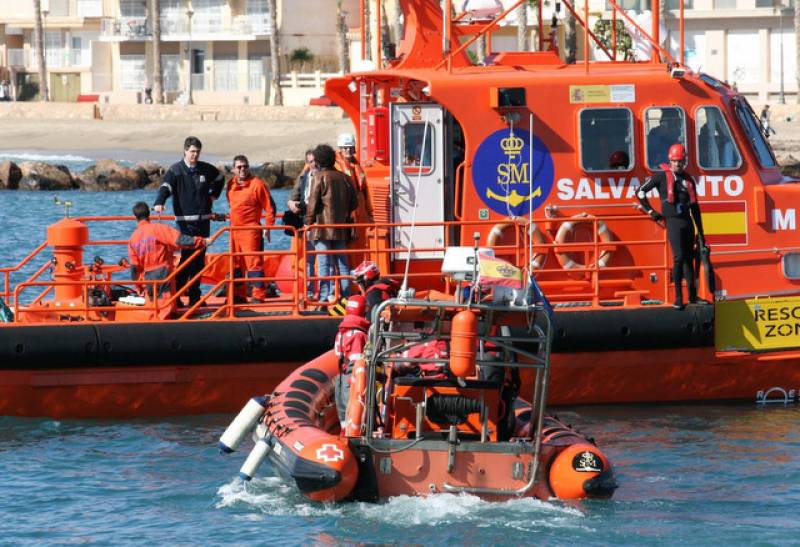 In the first six months of this year alone, 951 people have died in shipwrecks trying to cross into Spain, the majority of whom (778 people) were heading to the Canary Islands. In total, it’s the equivalent of one person dying every four and a half hours.
In the first six months of this year alone, 951 people have died in shipwrecks trying to cross into Spain, the majority of whom (778 people) were heading to the Canary Islands. In total, it’s the equivalent of one person dying every four and a half hours.The deadliest month of this year for migrants crossing by small boat into Spain has been June, according to the charity, with 332 fatalities, followed by February, with 237. In 14 separate cases, the boats involved in these tragedies disappeared with all their occupants and the bodies were not recovered.
Every year dead bodies are found floating in the water and washed up on beaches from refugees who didn’t make it. While the majority of the migrants are adult men, it is not uncommon for young children and pregnant women to try to make the perilous crossing. It is estimated that over 4,000 people die every year trying to make this crossing, many of them in summer when the sea is thought to be calmer and safer.
The report from Walking Borders makes damning accusations of “poor coordination between the countries that must activate the relief services” and accuse the Spanish rescue services of ignoring boat passengers in distress and in need of help if they deem it to be the responsibility of the Moroccans, even if the better-prepared Spanish rescue boats are closer.
They criticise the fact that even when tiny inflatable boats overloaded beyond capacity are floating in the open sea, maritime services do not necessarily label them as ‘unsafe vessels’ that are exposed to a serious risk, essentially condemning the boats’ occupants to danger of drowning.
What’s more, some migrants who do land have even reported being shot at, and the police just transfer them straight to the Temporary Attention Center for Foreigners instead of to hospital. In the wake of a BBC investigation that found Spanish border police were responsible for the deaths of more than 30 migrants who tried to cross the Melilla land border last summer, perhaps these accusations should not be surprising.
As well as the sea crossing by boat, others try to enter Spain by stowing away on large container ships, on planes or under haulage lorries, or else trying to paraglide or swim their way in. The prospect of a channel tunnel would only add another option for migrants to stowaway, likely making dangerous and potentially fatal forays on foot through the tunnels. The illegal crossings show no sign of slowing down and no sign of becoming safer thanks to improved oversight from the Spanish or Moroccan authorities, though the prospect of a right-wing coalition government in Spain that talks tough on immigration could change that, one way or another.
Murcia
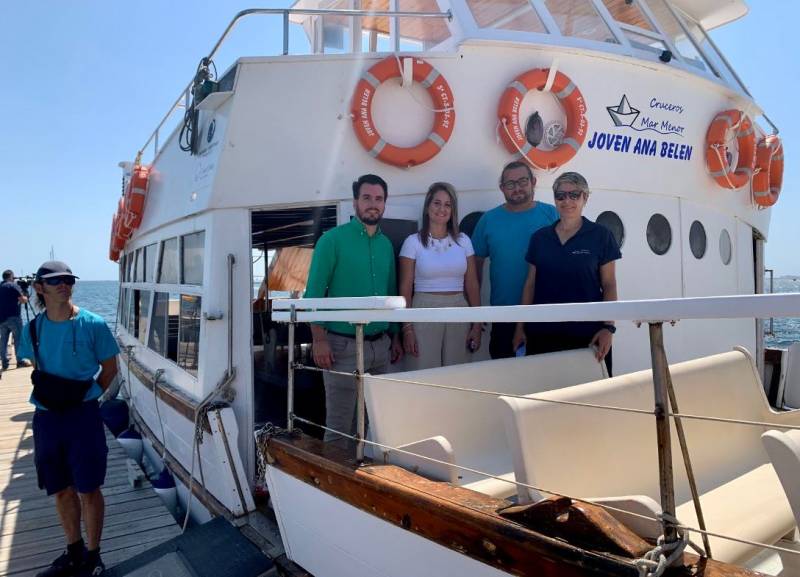 There was much excitement in the Region of Murcia again this week as the new ‘water taxi’ service finally got underway to take people back and forth across the Mar Menor between Santiago de la Ribera and La Manga del Mar Menor, and there was even an added surprise with the grand opening.
There was much excitement in the Region of Murcia again this week as the new ‘water taxi’ service finally got underway to take people back and forth across the Mar Menor between Santiago de la Ribera and La Manga del Mar Menor, and there was even an added surprise with the grand opening.See, the ferry had been out of service since December when the company running it simply stopped for no apparent reason. And San Javier Town Hall promised a couple of months ago that they would replace that old ferry service with some small, fast boats.
Well, those have duly started up, with the addition of a larger ferry too. While the small boats are all well and good, running every day of the week, five times a day in each direction with room for 14 passengers on each one, in honesty most people are more excited about the larger ferry service, which will only run on Tuesdays, Thursdays and Saturdays and do four trips a day in each direction.
The ferry will be able to carry up to 120 passengers and you can even take a bicycle on board, making this a popular way to start or end a weekend bike ride. Tickets cost around 6 euros, and you can be sure that people are going to be using this service like crazy this summer. In fact, there are already plans to extend and increase the number of journeys, at least of the small boats, and add some new stops along the coast of the Mar Menor, operating as a kind of water bus.
 Also in La Manga, plans are moving ahead to build a brand-new ‘sustainable sports park’ up near the Puente del Estacio bridge. The contract for the first phase of construction has been approved for the open-air sports development, which will stretch across 15,000m2 of currently unused scrub land that is due to be turned into a football pitch and stands, a basketball court, cycle lanes, running tracks, a climbing wall, green areas and more.
Also in La Manga, plans are moving ahead to build a brand-new ‘sustainable sports park’ up near the Puente del Estacio bridge. The contract for the first phase of construction has been approved for the open-air sports development, which will stretch across 15,000m2 of currently unused scrub land that is due to be turned into a football pitch and stands, a basketball court, cycle lanes, running tracks, a climbing wall, green areas and more.There is no completion date as yet for this project, which is part of the larger ‘La Manga 365’ programme designed to pump massive amounts of money into rejuvenating and making the most of this popular strip of Spanish coastline. When it is eventually completed, though, it will be another feather in the cap of La Manga as a top-quality tourist destination for both Spanish and overseas visitors, as well as a focal point for sporting facilities in Spain and a desirable residential area with plentiful resources for locals.
From new beginnings to an age-old saga, the spectre of the Polaris World group of companies still haunts the Region of Murcia as they have the largest tax bill of anyone in the autonomous community, despite being largely inactive for over 12 years.
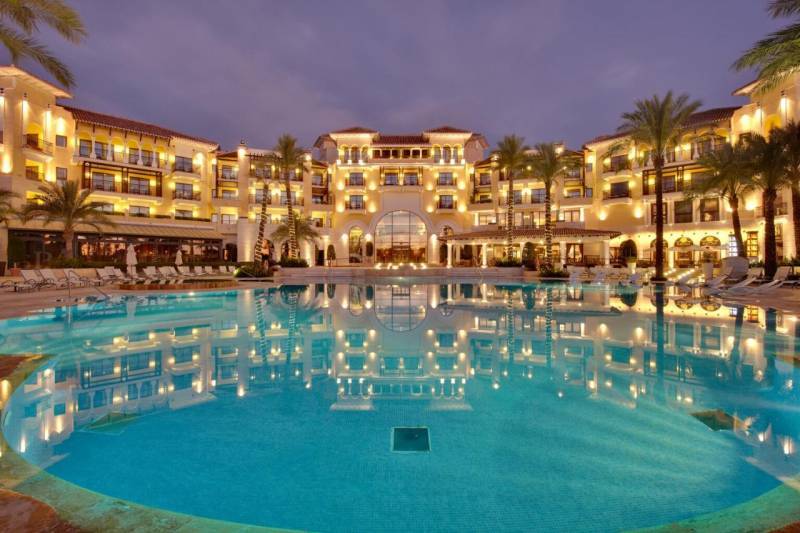
Polaris, who at their peak were the second biggest employer in the Region and the largest holiday home developer in Spain, succumbed to the devastating effects of the financial crisis in 2008 when the property bubble burst. They went from building Jack Nicklaus-sponsored golf resorts like Condado de Alhama, Hacienda Riquelme and Las Terrazas de la Torre and having an annual turnover of more than 800 million euros to declaring bankruptcy in 2016. While they have reduced the amount they owe to the taxman by around 15 million euros in the last year, they still have an outstanding tax debt of at least 281 million euros, making them the second biggest tax debtor in Spain behind real estate property group Reyal Urbis.
Elsewhere in Murcia, other companies who owe millions in tax include Nueva Condomina Developments SL, builder of the Nueva Condomina shopping centre (18,139,935 euros of debt) and football club Real Murcia CF (9,359,520 euros).
Talking of the Condado de Alhama golf resort, the new management Alhama Signature Golf Academy are promoting fiercely. They have an Open Day coming up on August 15 for golfers to come along and get to know the course and revamped facilities, and every Wednesday and Sunday in July and August parents can send their children to have some swing and putting training for an hour and a half every morning.
The oft-overlooked Calasparra in the Region of Murcia has a lot to offer anyone in search of something to do this summer, notably a picturesque day rafting on the River Segura and a chance to eat some delicious dishes made using the local variety of Calasparra rice!
Check out our EVENTS DIARY for more ideas of what to do in the Region of Murcia:
Spain
An Irish tourist in the town of Salou near Barcelona this week is under investigation for suspected murder. The 30-year-old Dublin man was found by police lying next to his deceased partner in the corridor of a four-star Costa Dorado hotel last weekend with self-inflicted wrist wounds.
Mum of two Kirsty Ward, also Irish, had been strangled to death with some sort of ligature right outside her room and, after a quick check-up in a Tarragona hospital, the man was arrested on suspicion of murder.
This week he was denied bail and remanded in custody and it has since come to light that the suspect has close ties to the notorious Kinahan cartel. Reports suggest he was once arrested alongside hitman Caolan Smyth, who is currently serving a 20-year sentence for the murder of rival Hutch gang member James ‘Mago’ Gately.
Barcelona police, known as the Mossos d’Esquadra, haven’t commented on the alleged cartel link, but confirmed that the suspect significantly “slowed” their attempts to notify the dead woman’s family during questioning.
Moving from mainland Spain over to the Canary Islands now and an extraordinary find was made by scientists examining the body of a sperm whale that washed up dead on Nogales beach on the northeast coast of La Palma on May 21.
The experts initially believed the enormous cetacean, which measured almost 13 metres in length, had collided with a boat and died from its injuries, but a necropsy revealed a large obstruction in the whale’s intestine.
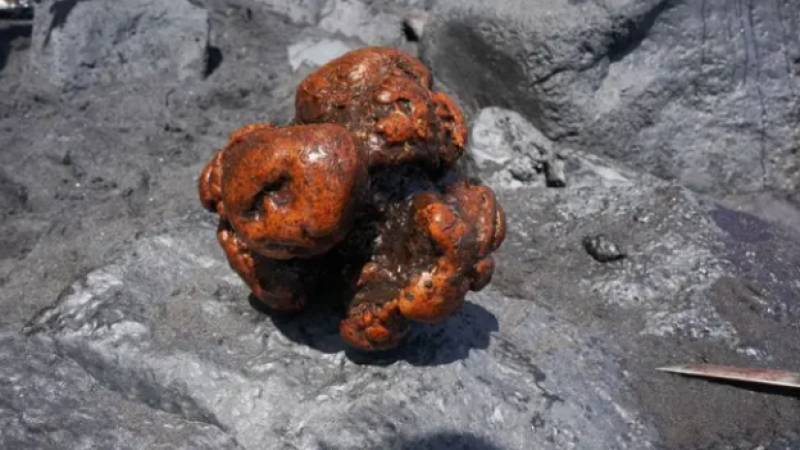
The blockage had been caused by the formation of an ambergris stone, a rare substance produced in the stomach of around one in every 100 sperm whales. It is formed when indigestible parts of the whale’s prey, like the beaks, move into the animal’s intestines and bind together over time, forming a solid mass of valuable ambergris.
The stone found in the Canary Island sperm whale weighed 9 kilos and was 60 centimetres long. It’s estimated that each kilo of ambergris is worth between 50,000 and 80,000 euros when it is sold for use in preparing high-end cosmetics, so professor Antonio Fernández, who made the discovery, believes this amber rock could be worth upwards of half a million euros.
Only around 1% of these cetaceans produce this precious substance, so it really is an incredible find, and the professor wants it to stay in the Canary Islands and not be sold as its value is really incalculable.
Also invaluable is a new agreement signed by the British and Spanish governments which will make it easier for university-level students in Britain to get into Spanish universities.
The idea is to allow students with UK qualifications, including A-levels and equivalents, to access universities in Spain without the need for the Spanish general university entrance exam. It is expected to benefit not only those students who studied in the UK, but also those who studied the UK curriculum in British schools in Spain – approximately 70,000 students across more than 80 different schools.
Alicante
Brazen beachgoers bagging the best spots on Benidorm beaches have sparked outrage once again in the popular resort.
The practice of ‘reserving’ the prime space along the waterfront has seen eager bathers get up at the crack of dawn or make their way to the sands the night before armed with deck chairs, umbrellas or towels that are strategically placed until the owners decide to hit the beach, which many times is not until significantly later in the day.
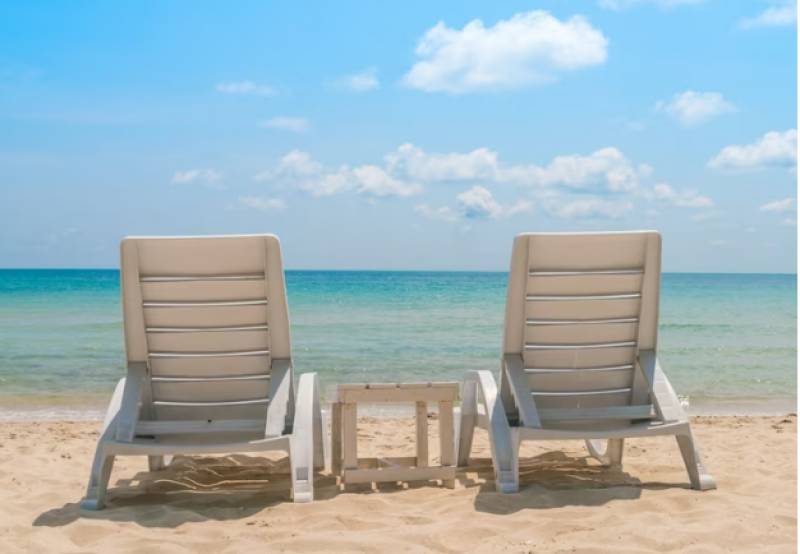
Their antics are an ongoing source of frustration for Benidorm locals and cause war each and every summer, but it’s getting out of hand with barely a scrap of sand available to late risers in recent weeks. It’s particularly rife in Rincón de Loix and Torrejó and at points on the Levante beach.
Many beachgoers have taken matters into their own hands and moved unoccupied sunbeds, which has naturally led to some nasty public rows.
The Councillor for Beaches, Mónica Gómez, said that “it is an issue that worries us” and she explained that the authorities are trying to find a balance that keeps everyone happy. It’s “a matter of awareness and respect,” she added.
It's worth remembering, Local Police actually have the right to remove belongings if they’ve been left unattended for a long period of time and in nearby Torrevieja and Calpe the authorities will actually fine anyone caught trying to reserve a spot with a chair or umbrella.
Drug traffickers aboard an 18-foot British luxury yacht were caught red-handed unloading a massive drugs haul of hashish with a street value of 32 million euros in Santa Pola Alicante this week.
Investigators believe the drugs, confiscated on the shores of Varadero beach, were transferred onto the British-flagged ‘Getaway of London’ at sea after a four-engined narcotics boat was detected sailing off Alicante coast at high-speed.
The yacht came to the authorities’ attention following a tip-off that a large quantity of hashish was being trafficked to Alicante province from Africa.
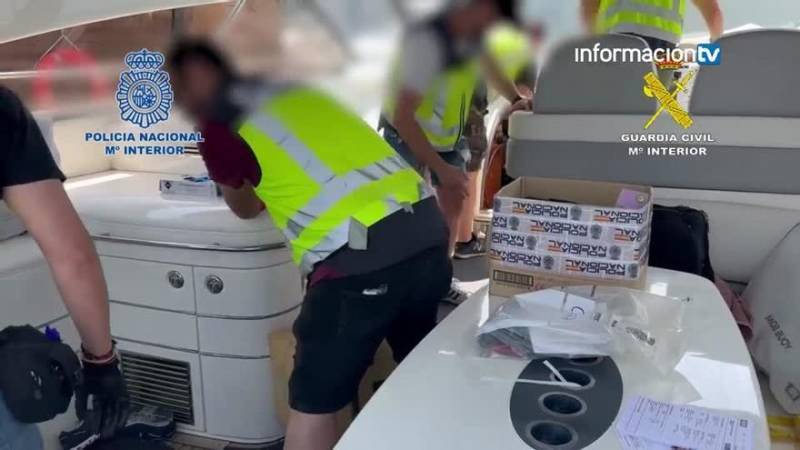
Three people were arrested in the Varadero area of Santa Pola, where the yacht was moored, and a fourth handed himself in to the Guardia Civil in La Vall d’Uixó, in the neighbouring province of Castellón, a few days later. Police are hunting for an undisclosed number of people who managed to flee.
Elsewhere, charges were this week dropped against two French men accused of the alleged multiple rape of an 18-year-old female Nordic tourist in Torrevieja.
The Provincial Court ordered the temporary suspension of the charges against two of the four young men aged between 19 and 22 who were charged with the gang rape last September due to a lack of evidence.
Of the two who have now been acquitted, one was temporarily released after being arrested by the Guardia Civil and brought before the courts, while the other was imprisoned and has spent nine months in Fontcalent prison.
Two other defendants are still in custody and will be tried as perpetrators of a sexual assault punishable by up to 12 years in prison.
The victim’s ordeal allegedly took place at her holiday apartment after she was befriended by three of the four men.
Following the horrific assault, the Nordic tourist, who had lost her purse and mobile phone earlier in the evening, managed to flee the flat and ran into the street where she was helped by passers-by who took her to the Guardia Civil HQ.
She was able to give police descriptions and even details of conversations she had overhead that helped detectives to detectives locate the four to a restaurant where they were arrested while having lunch.
What’s going on in Alicante? Coming up in two weeks, Dire Straits Legacy are performing live in concert at the Plaza de Toros Bullring in Alicante city. It’s not Mark Knopfler, but they do bill themselves as “the closest you’re going to get” to seeing Dire Straits since they’ve actually got three former band members playing and several others who have played live or recorded with the rock legends in the past.
Buy your tickets today and you can be sure it won’t be Money for Nothing…
Check out the Costa Blanca What’s On and Where to Go Facebook group to see more things to do around Alicante province!
Andalucía
Malaga was gripped by a fascinating and rather unusual trial this week when a 55-year-old British man stood before a jury of his peers accused of breaking into a woman’s apartment to take a shower.
The unbelievable event dates back to October 2021 when the UK holidaymaker developed a dicky tummy when walking home after a night of drinking and eating with friends. He urgently needed the bathroom as he rushed along Cala Beatas in the city centre but as it was after 3.30am, everything was closed.
According to the lawyers, the Manchester man spotted a woman standing outside an apartment building and asked her if he could use her facilities to “relieve himself.” Apparently, something got lost in translation here as he let himself into her flat, where the door was ajar, and proceeded to take a shower after rifling through her closets to find some clean clothes.

The woman claims that when she returned to her home, she was startled to find the stranger in her shower and called the police, who arrested the UK tourist.
Ultimately though, the jury declared the British man not guilty on Wednesday July 5 by seven votes in favour and two against after conceding the “embarrassing” nature of his situation when he couldn’t find any public bathrooms still open.
A flight from Glasgow bound for Malaga had to cut its approach this week and make a rapid descent to the Costa del Sol airport when a 4-year-old child became seriously ill on board. A doctor also on the flight attended to the little boy, who is believed to have suffered a possible epileptic seizure.
The pilot radioed the control tower requesting urgent landing and the runway was quickly cleared. Medical personnel were waiting to look after the young patient as soon as the plane touched down.
On the water, cruise tourism looks set to break records this year in Andalucía, suggest the latest figures on the number of tourists coming to the autonomous community. Statistics published by Puertos del Estado have shown that between January and May of this year – even before the summer high period began, a total of 387,129 passengers disembarked from cruise ships in Andalucía ports.
This is in comparison with 191,199 in the same period of 2022, an increase of 202%!
Cádiz was the port that had the most passengers and ships – 198,632 passengers and 131 ships – followed by Málaga (167,401 and 118). Great numbers for the Andalucía tourist industry but well short of the port in the number one spot nationally, Las Palmas, which had 356 cruise ships and 819,936 passengers.
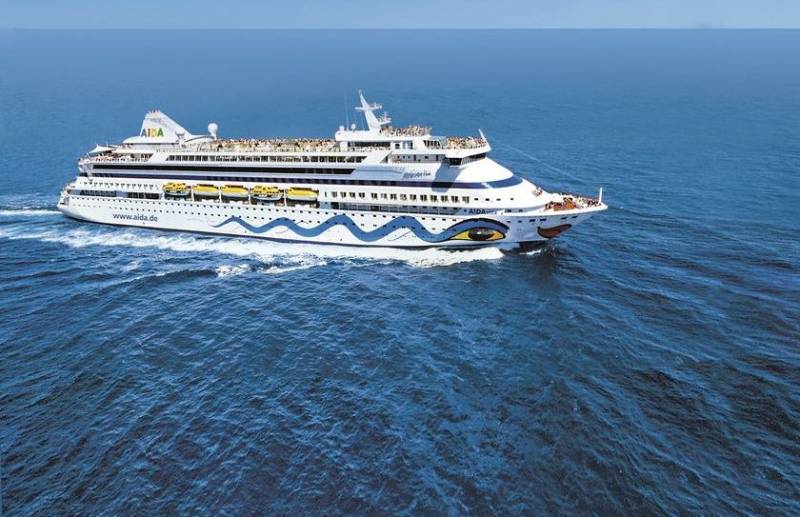
You may have missed…
- Scabies infections explode in Spain.
There has been a rise in scabies infections in Spain, and doctors are blaming the fact that the mites that cause this disease have become resistant to the most common drug used to fight it. - Vatican Cricket Club visits Spain on tour.
While England and Australia fans can’t tear their eyes away from the Ashes, the Pope and his Cardinals in the Vatican City may have their sights on another series of cricket matches as the St. Peter’s Cricket Club – Vatican makes its way around Alicante and Andalucía on tour. - easyJet pilot makes 19 passengers get off Lanzarote flight due to weight of plane and weather conditions.
Nineteen passengers were made to get off an easyJet flight from Lanzarote to Liverpool after the pilot decided the plane was “too heavy” to take off in adverse weather conditions. - 1.5-metre squid washes up on Cádiz beach.
A giant squid measuring a metre and a half has been found dead on the Playa del Poniente beach in La Línea de la Concepción (Cádiz), near Gibraltar. - 8 dog-friendly beaches in the Region of Murcia.
Here are eight of the best dog-friendly beaches on the Costa Cálida this summer!
That’s all for this week. Thanks for reading and be sure to try and keep cool out there (the right way).
See you next week!
Contact Murcia Today: Editorial 000 000 000 /
Office 000 000 000


























